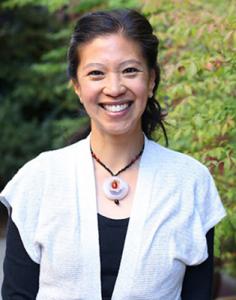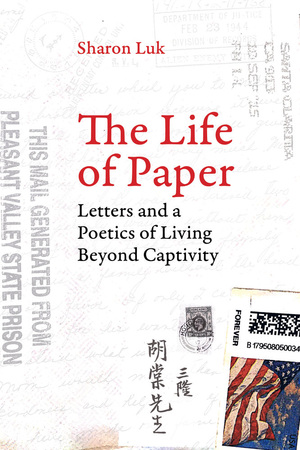
Sharon Luk
Education
Ph.D. American Studies and Ethnicity, University of Southern California (2012)
M.A. Education, University of CA, Los Angeles (2006)
B.A. Comparative Literature and Ethnic Studies, Brown University (magna cum laude, 2001)
Statement
I was born and raised in the San Francisco bay area. Before pursuing an academic career, I worked mainly in fields of independent media and youth and community development, with training in domestic violence counseling and non-discursive techniques in abuse recovery. Broadly, my fields of study include racism and racial capitalism, ethnic ontologies, epistemology, social movements, feminisms, and ephemeral archives. My teaching and research focus on “anthropologizing” Western Civilization and exploring the role of cultural production in communal survival and sustainability.
Research
My book, The Life of Paper: Letters and a Poetics of Living Beyond Captivity (University of California Press, 2017), explores the lifeworlds sustained through letter correspondence within the evolution of mass incarceration and its attendant racial regimes in California history. Spanning three different phases of development in the U.S. West, this investigation uncovers how people facing systematic social dismantling have engaged letter correspondence to remake themselves, from bodily integrity to subjectivity to collective and spiritual being.
My new research returns to the history of knowledge production that defines Western civilization in contradistinction from “the Orient.” I aim to interrogate shifts in such “East-West” discourse and its transformative potential if we situate “the West” in the context of Afro-modernity—its epistemological foundations and world concept—rather than in assumptions of European dominance. I am developing two lines of study in this regard. First, I am interested in exchanges between engaged Buddhism and Black liberation theology beginning in 1965 in an effort to articulate a different approach towards a politics of death, or what scholars now call “necropolitics,” at this interface. Second, I am working on an article, provisionally entitled “Predicaments of Racism: The Ideological Development of Confucianism in the Global Age, Revisited,” that addresses the work of transnational Chinese scholar Chenshan Tian. Building on the way he distinguishes between the epistemological assumptions of Chinese and European thought, as well as the implications of this difference for contemplating governance and political-economy in the twenty-first century, I aim to place these insights in dialogue with work in Black, Indigenous, and Ethnic Studies that more thoroughly considers the foundational violences of racism in the development of global capitalism and modern world systems. My long-term goal for this latter work is to help excavate the distinct processes of racialization attendant on Chinese, distinguishable from European, modes of dominance and, in this context, also to revisit enduring foundations for sustainable development and transformative social justice practices embedded in contending interpretations of Chinese social and philosophical traditions.
Publications
Book:
The Life of Paper: Letters and a Poetics of Living Beyond Captivity (University of California Press, 2018).
Articles:
“‘Sea of Fire’: A Buddhist Pedagogy of Dying and Black Encounters Across Two Waves.” Souls: A Critical Journal of Black Politics, Culture, and Society 20.3 (2018): 267-288.
“Ourselves At Stake: Social Reproduction in the Age of Prisons.” CR: The New Centennial Review 18.3 (2018): 225-54.
“The Problem of Study: China in American Studies and the Materials of Knowledge,” American Quarterly special issue on “The Chinese Factor,” 69.3 (2017): 523-32.
“A Better Place” (Intervention Symposium: Reflections on the Events Surrounding Trayvon Martin). Antipode: A Radical Journal of Geography (2013): n. pag. Web: https://radicalantipode.files.wordpress.com/2013/11/3-luk.pdf
“Building People's Histories: Graduate Student Pedagogy, Undergraduate Education, and Collaboration with Community Partners” (co-authored with Genevieve Carpio [lead author] and Adam Bush). Journal of American History 99.4 (2013): 1176-88.
“Alienation.” Entry in The Blackwell Encyclopedia of Literary and Cultural Theory, Vol 1 (1900-1966), ed. Michael Ryan and Gregory Castle. Malden, MA: Blackwell, 2011.

